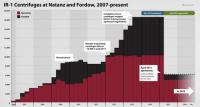-
New tool keeps track of violent groups without having to geolocate the tweets
Researchers have developed new sentiment analysis algorithms which can monitor the social network Twitter in search of violent groups. The system analyzes both the messages these individuals share and how their relationships develop. The police and other law enforcement agencies could use the tool to detect critical points, threats, and areas with concentrations of potentially dangerous people.
-
-
Ex-Treasury official: Hezbollah has turned Lebanese villages into missile silos
Hezbollah has embedded its rocket arsenal in villages across Lebanon, ensuring that any Israeli strike on the Iran-backed terrorist group’s military assets will lead to mass civilian casualties, a former Treasury official said on Monday. Hezbollah has turned the Shiite villages “into essentially missile silos,” Jonathan Schanzer said. “What you have is rockets placed under homes, schools, apartment buildings, etc., so when the Israelis need to try to strike these weapons before they’re launched, it will potentially lead to mass casualties.”
-
-
Climate disasters increase risk of armed conflict in multi-ethnic countries
Climate disasters like heat-waves or droughts enhance the risk of armed conflicts in countries with high ethnic diversity, scientists found. Each conflict is certainly the result of a complex and specific mix of factors, but it turns out that the outbreak of violence in ethnically fractionalized countries is often linked to natural disasters that may fuel smoldering social tensions.
-
-
Russian government hackers leaked DNC e-mails: Cybersecurity experts

Robby Mook, Hillary Clinton’s campaign manager, said on Sunday that Friday’s release by WikiLeaks of Democratic National Committee (DNC) internal e-mails was the work of Russian government hackers. The leak, Mook said, was part of an effort by President Vladimir Putin and people in his circle to weaken Clinton and increase the chances of a Donald Trump victory in November. Cybersecurity experts support Mook’s claims.
-
-
Report: Next war with Hezbollah could cause “thousands of civilian deaths” in Israel

Israeli officials believe that a future war with Hezbollah, with its advanced Iranian-supplied rocket arsenal, could lead to “thousands of civilian deaths,” according to a new study. Hezbollah is now believed by Israel to possess about 150,000 rockets, which exceeds the combined arsenals of all non-U.S. NATO countries and is ten times larger than its arsenal before the 2006 war.
-
-
Do think-tanks matter? Expert says “think again”

A recently published study found that public sector workers judged studies and reports generated by scholars affiliated with universities to be more credible than reports or studies purported to be from a think-tank or advocacy group.
-
-
There is no manual on how to defeat ISIS – “we’re writing it”: John Kerry
Speaking Thursday at the opening of a 3-day meeting in Washington, D.C. of thirty countries currently engaged in fighting ISIS, Secretary of States Joh Kerry said, “We are engaged in an historic effort. Nothing like this coalition has ever before been assembled. And we’re not following a manual on antiterrorist coalition-building, we’re writing it.”
-
-
Brazil's police arrest 10 ISIS sympathizers suspected of Olympics terror plot

With two weeks to go to the opening of the Olympic Games in Brazil, the Brazilian police have arrested ten alleged ISIS sympathizers in the states of São Paulo and Parana on suspicion of planning acts of terrorism during the games. Two other suspects are still at large. Brazil’s intelligence agency ABIN has worked with foreign intelligence services to provide the information that led to the arrests.
-
-
Nice terrorist had accomplices, was planning the attack for a year
Mohamed Lahouaiej Bouhlel, the truck driver who killed eighty-five people in Nice on Bastille Day, had accomplices – and he had been planning his attack for months, the prosecutor leading the investigation said. Prosecutor Francois Molins said five suspects were facing terrorism charges for their alleged roles in helping the driver.
-
-
Baton Rouge gunman was a member of black “sovereign citizen” group

Gavin Long, the 29-year old former Marine who on Saturday killed three Baton Rouge police officers, was a member of a black antigovernment sovereign citizen group whose members believe they are indigenous to the United States and beyond the reach of the federal government. Members of the Washitaw Nation believe that they are descendants of black people who occupied the North American continent tens of thousands of years before white Europeans arrived, and, therefore, they fall outside federal authority.
-
-
Indonesian security forces kill country's most wanted Islamist militant
Abu Wardah Santoso, Indonesia’s most wanted Islamist militant, was killed in a shootout with security forces. Santoso, who was the leader of the East Indonesia Mujahideen militant group which, in 2014, claimed allegiance to ISIS, had eluded capture for more than five years.
-
-
Updated 2015 Global Terrorism Database release
The National Consortium for the Study of Terrorism and Responses to Terrorism (START) has released an update to its Global Terrorism Database (GTD), an open-source database including information on terrorist attacks that took place around the world between 1970 and 2015. Among the findings: The total number of terrorist attacks and total deaths due to terrorist attacks worldwide decreased by 12 percent in 2015, compared to 2014. This was largely due to fewer attacks and deaths in Iraq, Pakistan, and Nigeria. This represents the first decline in total terrorist attacks and deaths worldwide since 2009.
-
-
DHS S&T awards $3.66 million for privacy-enhancing technology R&D
DHS S&T has announced the award of three contracts totaling $3.66 million to fund the research and development of privacy-enhancing technologies that better defend personally identifying information and protect privacy in cyber space.
-
-
Protecting against “browser fingerprint”
Imagine that every time a person goes out in public, they leave behind a track for all to see, so that their behavior can be easily analyzed, revealing their identity. This is the case with people’s online browser “fingerprints,” which are left behind at each location they visit on their internet browser. Almost like a regular fingerprint, a person’s browser fingerprint — or “browserprint” — is often unique to the individual. Such a fingerprint can be monitored, tracked, and identified by companies and hackers.
-
-
Secret side deal cuts Iran’s breakout time in half in little more than a decade

Key restrictions on Iran’s nuclear program will ease in slightly more than a decade, cutting in half the time Iran would need to build a nuclear weapons. The AP had obtained a document from a source inside the IAEA — a document which was the only secret portion to last year’s agreement between Iran and the P5+1 powers. The document said that after a period of between eleven to thirteen years, Iran could replace its 5,060 older, and inefficient, centrifuges with up to 3,500 advanced centrifuges.
-
More headlines
The long view
Factories First: Winning the Drone War Before It Starts
Wars are won by factories before they are won on the battlefield,Martin C. Feldmann writes, noting that the United States lacks the manufacturing depth for the coming drone age. Rectifying this situation “will take far more than procurement tweaks,” Feldmann writes. “It demands a national-level, wartime-scale industrial mobilization.”
No Nation Is an Island: The Dangers of Modern U.S. Isolationism
The resurgence of isolationist sentiment in American politics is understandable but misguided. While the desire to refocus on domestic renewal is justified, retreating from the world will not bring the security, prosperity, or sovereignty that its proponents promise. On the contrary, it invites instability, diminishes U.S. influence, and erodes the democratic order the U.S. helped forge.
Fragmented by Design: USAID’s Dismantling and the Future of American Foreign Aid
The Trump administration launched an aggressive restructuring of U.S. foreign aid, effectively dismantling the United States Agency for International Development (USAID). The humanitarian and geopolitical fallout of the demise of USAID includes shuttered clinics, destroyed food aid, and China’s growing influence in the global south. This new era of American soft power will determine how, and whether, the U.S. continues to lead in global development.
Water Wars: A Historic Agreement Between Mexico and US Is Ramping Up Border Tension
As climate change drives rising temperatures and changes in rainfall, Mexico and the US are in the middle of a conflict over water, putting an additional strain on their relationship. Partly due to constant droughts, Mexico has struggled to maintain its water deliveries for much of the last 25 years, deliveries to which it is obligated by a 1944 water-sharing agreement between the two countries.
How Disastrous Was the Trump-Putin Meeting?
In Alaska, Trump got played by Putin. Therefore, Steven Pifer writes, the European leaders and Zelensky have to “diplomatically offer suggestions to walk Trump back from a position that he does not appear to understand would be bad for Ukraine, bad for Europe, and bad for American interests. And they have to do so without setting off an explosion that could disrupt U.S.-Ukrainian and U.S.-European relations—all to the delight of Putin and the Kremlin.”
How Male Grievance Fuels Radicalization and Extremist Violence
Social extremism is evolving in reach and form. While traditional racial supremacy ideologies remain, contemporary movements are now often fueled by something more personal and emotionally resonant: male grievance.
